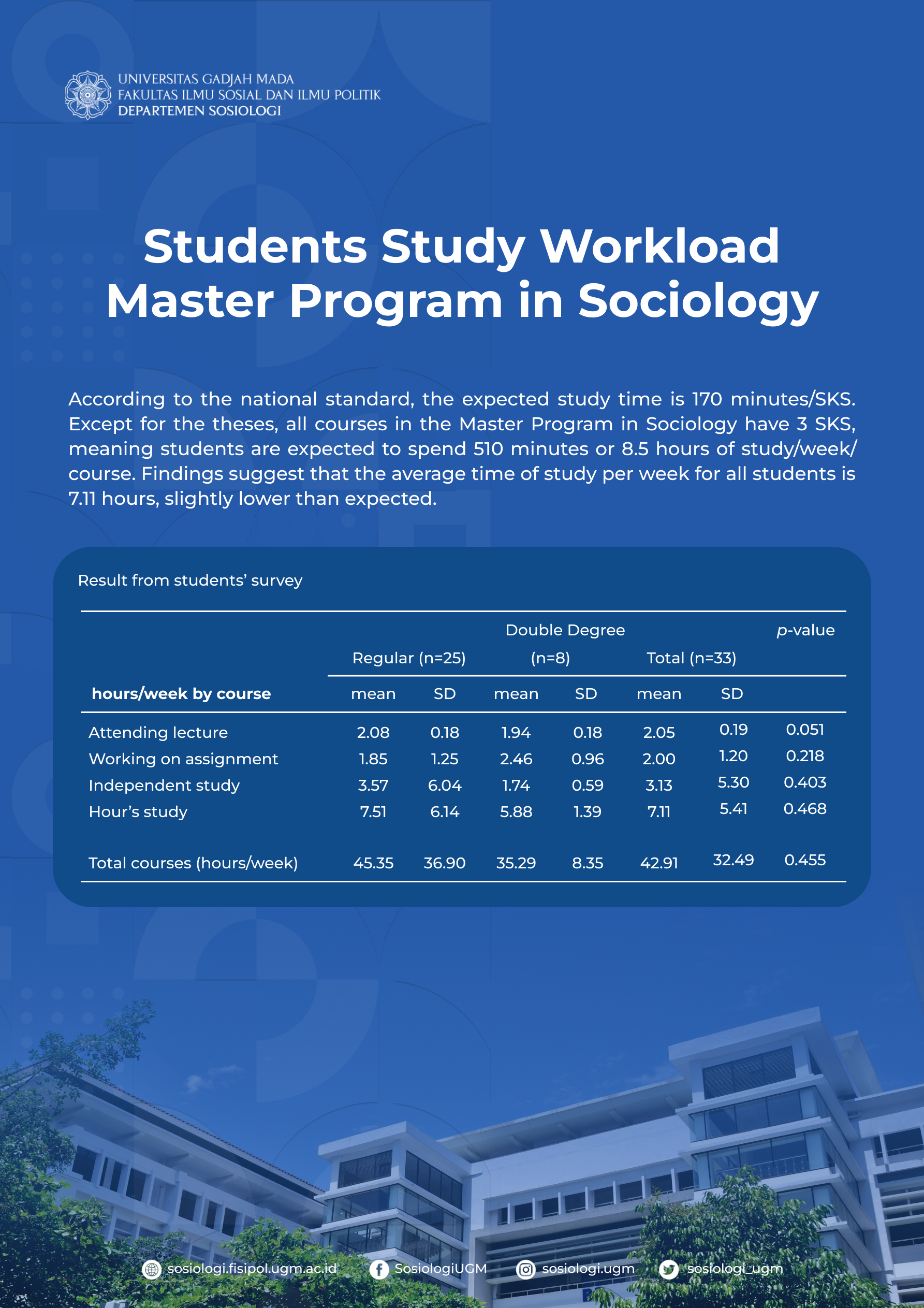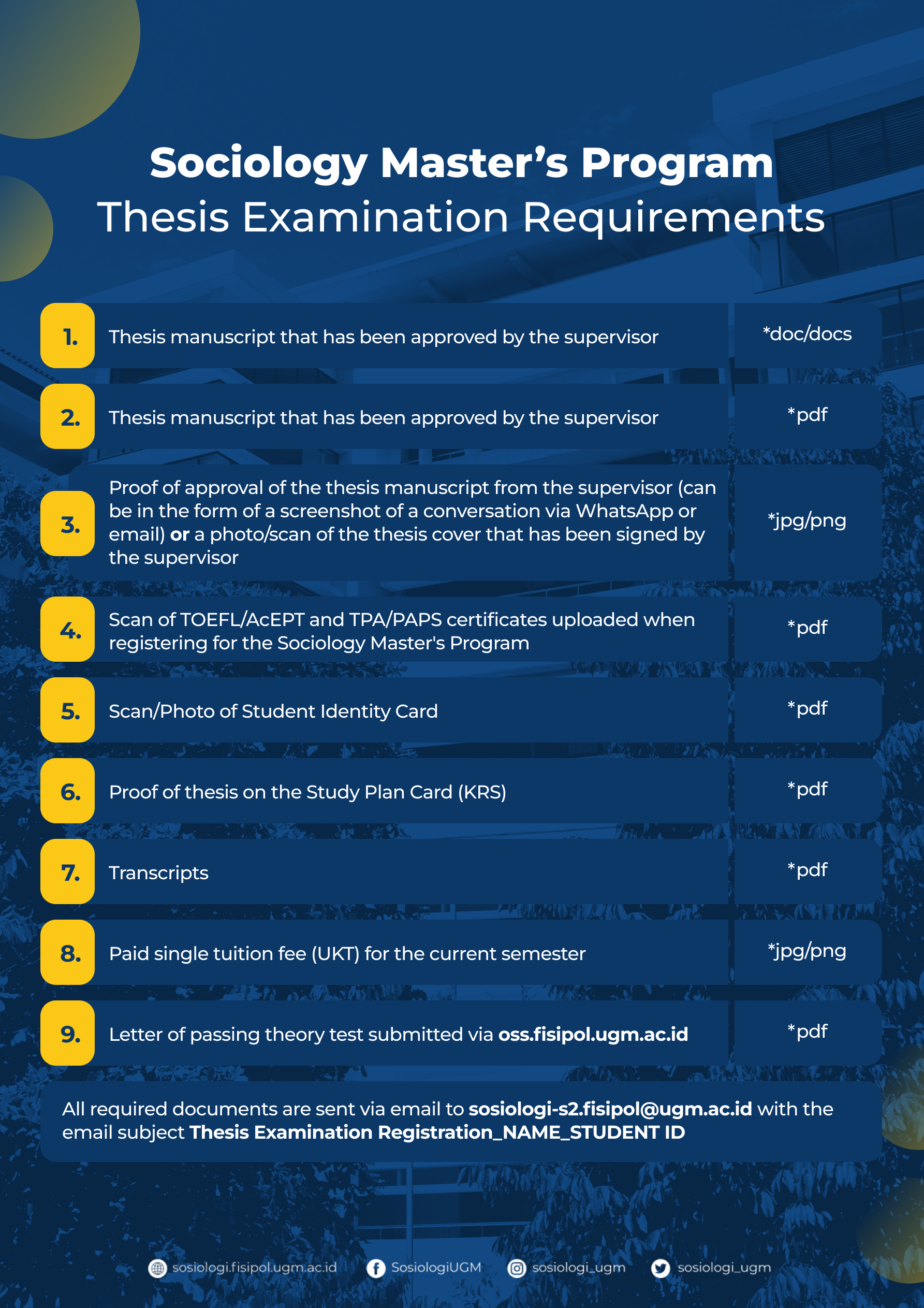Expected Learning Objectives
- Values (National core values)
- Primary competence for Master programme (National standard)
- Programme general competence
- Programme specific competence
1. Upholding norms, values, morals, ethics and professional responsibilities according to their field of expertise;
2. Able to communicate and develop/build trust effectively and efficiently according to their field of expertise;
3. Sensitive to and critical of social problems and phenomena and able to carry out advocacy; and
4. Able to work together with all elements of society and have critical abilities as a basis for advocacy and high adaptation.
1. Mastering sociological and social theories and social research methods to examine social issues critically;
2. Mastering the application of sociological, social and interdisciplinary theories to actively respond to humanitarian and life issues at local, national and global levels;
3. Mastering the management of social change; and
4. Mastering academic principles and ethics.
1. Able to analyze developments in science, technology and/or art by mastering and understanding scientific approaches, methods and rules along with their application by the study program’s scientific fields;
2. Able to solve problems in the Study Program’s disciplines through research and development based on scientific principles; and
3. Able to perform in a particular field of work as demonstrated by the ability to analyze problems comprehensively.
1. Able to apply sociological and social theories;
2. Able to critically analyze changes in digital society;
3. Able to utilize digital technology for emancipatory missions;
4. Able to analyze social policies critically and comparatively;
5. Able to formulate social policy options for social justice;
6. Able to analyse identity and citizenship issues in local and global contexts;
7. Able to formulate strategies to navigate challenges in realizing inclusive and equal citizenship;
8. Able to produce scientific work in the form of writing and/or creative products; and
9. Able to communicate, network and collaborate based on empathetic and emancipatory values to solve humanitarian and life problems.
Curriculum Structure
1st Semester | 2nd Semester | 3rd Semester | 4th Semester |
|---|---|---|---|
Quantitative Research Method (3 credits) | Qualitative Research Method (3 credits) | Thesis (9 credits) | Thesis (9 credits) |
Classical and Contemporary Theory (3 credits) | Critical and Postmodernism Theory (3 credits) | Thesis Defense and Graduation |
|
Elective Concentration Course (3 credits) | Research Plan and Preparation Seminar (3 credits) |
||
Elective Concentration Course (3 credits) | Elective Concentration Course (3 credits) |
||
Elective Concentration Course (3 credits) | Elective Concentration Course (3 credits) |
||
Elective Concentration Course (3 credits) | Elective Concentration Course (3 credits) |
||
18 credits | 18 credits | 9 credits | 9 credits |
Concentration Course
| Elective Concentration Course: Media and Digital Humanities | Semester |
|---|---|
| Digital Humanities | 1 |
| Political Economy of Digital Media | 1 |
| Digital State and Global Society | 2 |
| Cyber Security and Digital Culture | 2 |
| Elective Concentration Course: Identities and Global Citizenship | Semester |
| Conceptual Framework of Identity and Citizenship | 1 |
| Diversity, Democracy, and Social Movement | 1 |
| Sociology of Religion, Identity, and Citizenship | 2 |
| Global Mobility, Citizenship, and Youth Culture | 2 |
| Elective Concentration Course: Sociology and Social Policy | Semester |
| Political Economy of Social Policy in Indonesia | 1 |
| Social Policy: Concept and Issue | 1 |
| Gender, Inclusion, and Social Justice | 2 |
| Labour and Social Policy | 2 |



